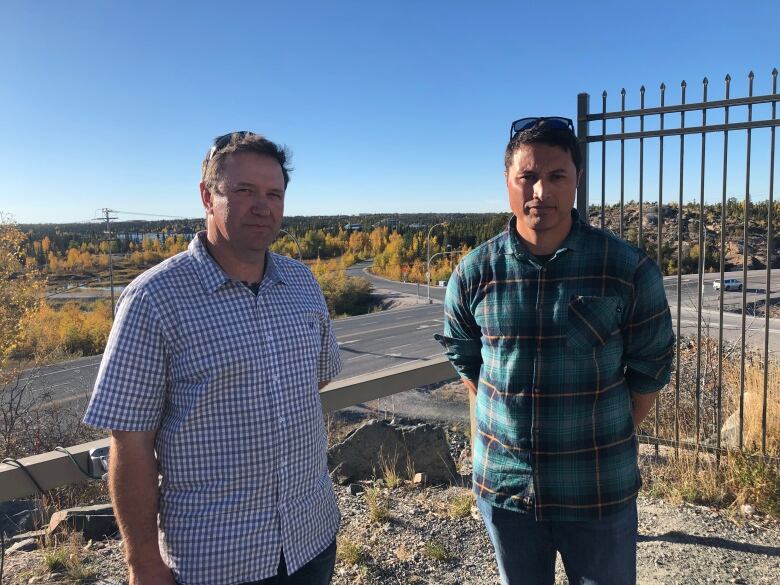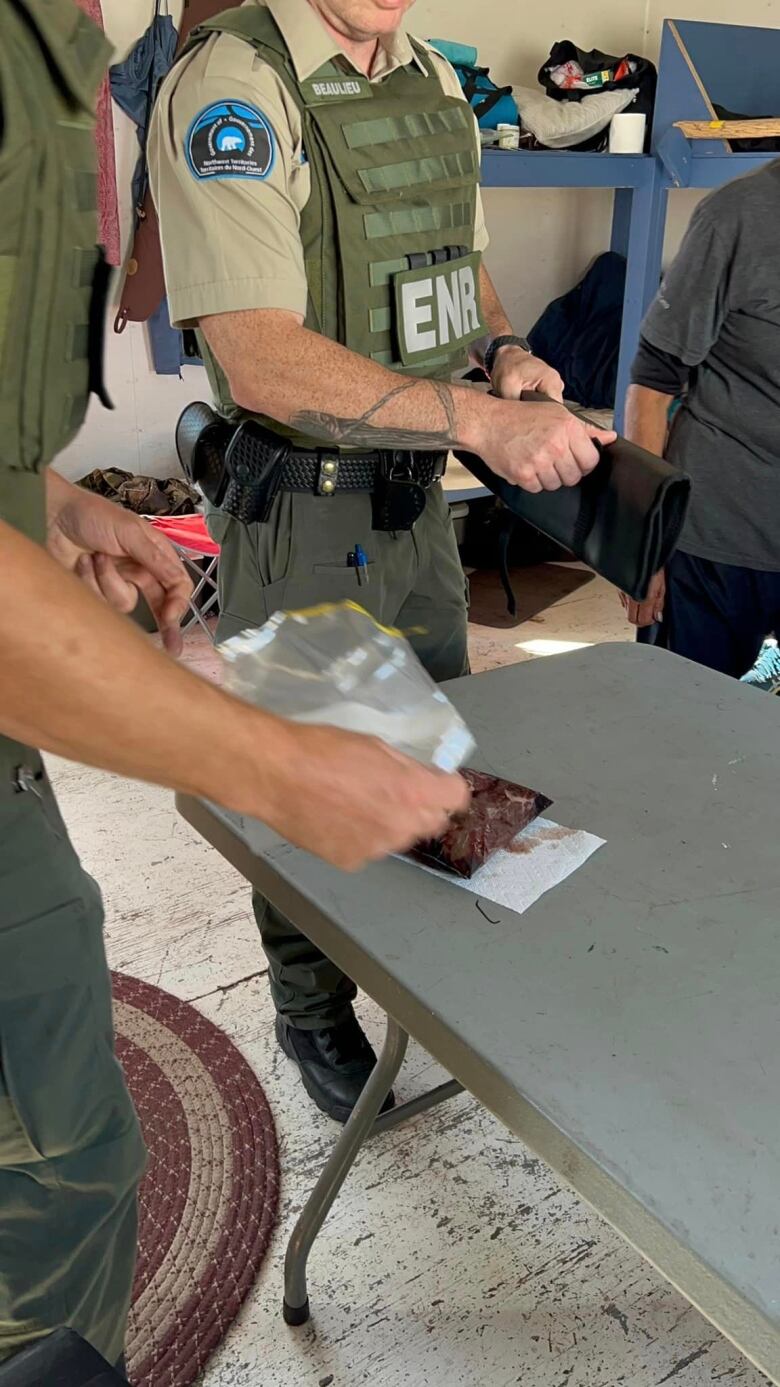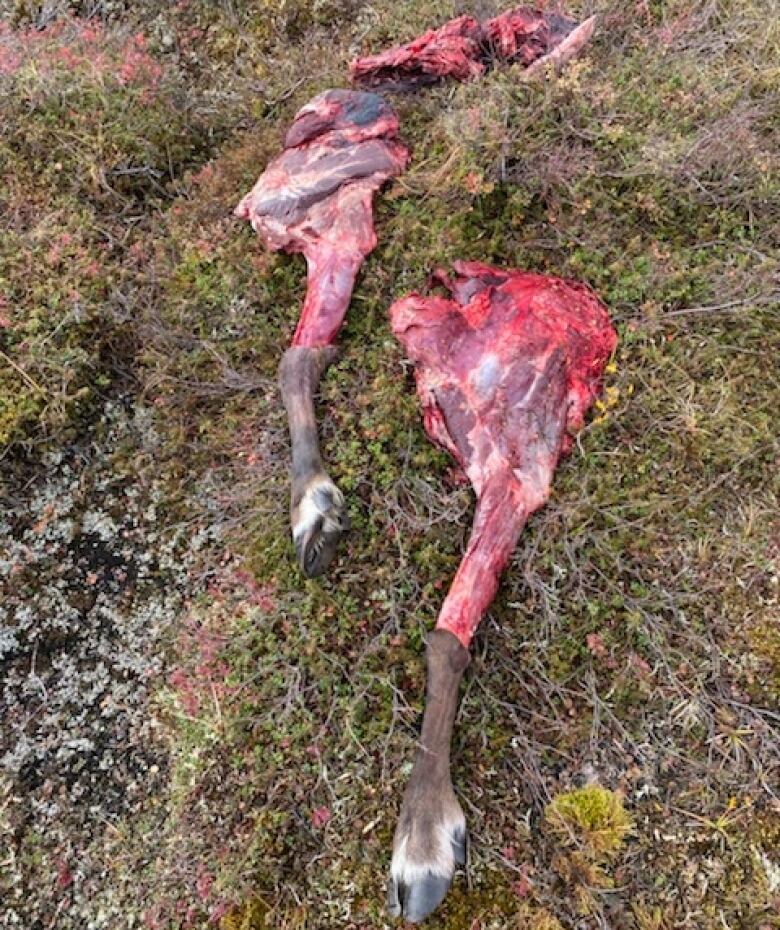New Zealand researchers on cultural exchange in utsel K'e shocked by ENR raid on camp
Officers were investigating illegal hunting of Bathurst caribou: minister

A pairof researchers from New Zealand visitingutsel K'e Dene First Nation for a cultural exchangesaid they were shocked by the "almost militant" raid on theculture camp by wildlife officers investigatingillegal caribou harvesting.
Puke Timoti is aresearcher with the Manaaki Whenua Landcare Research, a Crown research institute on land, environment and biodiversity.
Timoti isMori, an Indigenous person from New Zealand, a nation with a colonial history similar to Canada's.
"I was just shocked around just how certain approaches are still continuing in that manner," he told CBC News.
"We're very familiar with that back home and we just thought we wouldn't ever see it in another place."

The N.W.T. Department of Environment says officers were executing a search warrant after reports of illegal caribou hunting.
Environment Minister Shane Thompson said in a statement on Friday officers found the carcasses of 10 caribou within themobile no-hunting zone that follows the endangered Bathurst caribou herd to protect it from hunters.
Talk it out
Phil Lyver, also a researcher with Manaaki Whenua,said the situation could've been rectified more peacefully.
"What they should have done was ...come up the beach,had atalk with the elders at the camp," he said. "Let's have a cup of tea. Seriously, sit around the fire."
Instead,Lyver said they witnessed numerous officers dressed in tactical gear searching all the tents and teepees at the camp.
"There's a huge amount of hurt around the community with that response," he said.
"To come in and search the tents like that, we just felt was an overreaction."
Learning aboutThaidene Nn National Park

The pair were part of a 16-person group taking part in a two-weekcultural exchange that was being done to learn about the First Nation's involvement intheThaidene Nn National Park, where the raid took place.
"It was actually about what benefits they're achieving through the establishment of a national park," Lyver said.
The park is the product of an agreementsigned in 2019 between Parks Canada, the utsel K'e Dene First Nation,theDeninu K'ue First Nation, Yellowknives Dene First Nation, the Northwest Territory Mtis Nation and the Northwest Territories government.
But Lyversaid the raid has giventhem a new perspective on the territorial government's relationship with Indigenous nations.
"We've got these partnerships, you've got these agreements, but then you get a response like that from a government agency. And so it's just, it's just compounding the whole colonial experience," he said.
Video of raid posted to Facebook
Footage posted to Facebook by Iris Catholique, the Thaidene Nnmanager for utsel K'e Dene First Nation, shows a few minutes of the raid.
In one video a person can be heard asking officers,"Why are you doing this to elders?"as they search a Ziploc bag of meat.
According to the First Nation, wildlife officers helicoptered into thecamp on Artillery Lake on Sept. 13.
About80 utsel K'e Dene First Nation members were taking part in a culture camp at the time.

In the statement, Shane Thompson, the environment minister, said officers received two independent reports from members of the public on Monday about illegal harvesting.
"Officers initiated a field investigation at the site as well as at a secondary location working under the authority of the Wildlife Act, with a search warrant," he wrote.
Thompsonadded,"a significant amount of suspected wasted edible meat was identified."
The department can't share a lot of details, he said, because an active investigation is underway.
Thompson added many wildlife officers with his department have lived in the North for a long time.
"Caribou are important to them, the communities they live and work in and to elders," he said.
"Investigations like this are challenging. Enforcement of the mobile zone is an important part of the collaborative conservation measures we are taking to conserve the Bathurst herd."
The Bathurst herd has dwindled to about 6,200 animals from 470,000in 1986.
With files from April Hudson and Marc Winkler












_(720p).jpg)


 OFFICIAL HD MUSIC VIDEO.jpg)
.jpg)



























































































